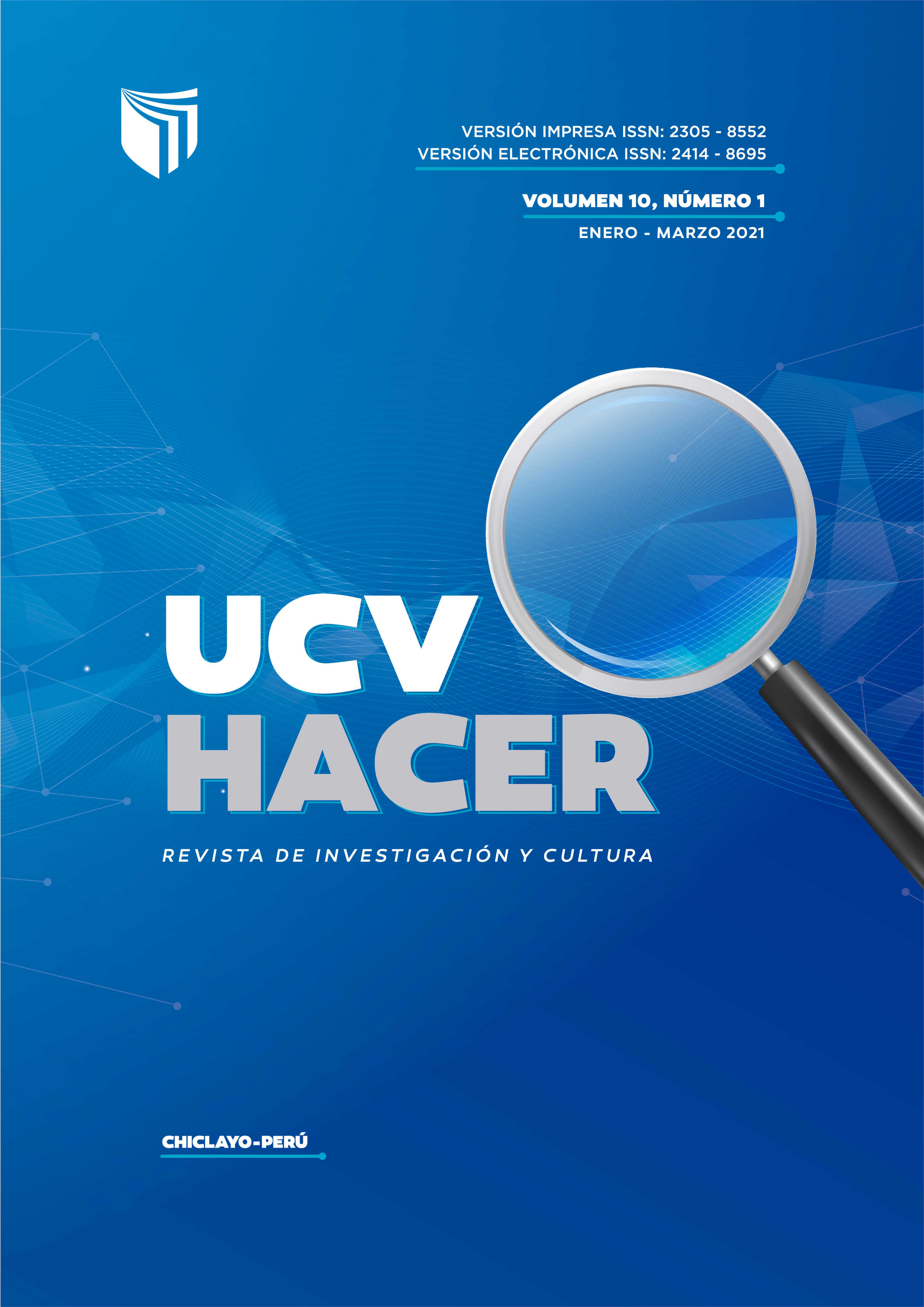Resiliencia en estudiantes adolescentes de una institución educativa de una zona urbano-marginal durante el covid-19
Resilience in adolescent students form an educational institution in an urban-marginal area during covid-19
DOI:
https://doi.org/10.18050/ucv-hacer.v10i1.2703Keywords:
Resilience, Adolescents, Covid 19, Urban marginal zoneAbstract
This research aimed to measure the level of resilience in adolescents in an educational institution located in an urban-marginal area during the Covid 19 pandemic, with the purpose of identifying the levels of emotional competence and self-acceptance during the health emergency, by applying the Wagnild and Youn Resilience Scale to 143 adolescents. The research method used was the descriptive one, with a nonexperimental design. The results indicate that the students are capable of adapting positively to adverse contexts, managing to develop their emotional competence, likewise, they possess the ability to build their own identity and accept themselves, essential factors for the development of an adequate self-esteem and the fulfillment of long term goals, for which they have sufficient resources to face their future.
References
Carazo, V. (2018). Resiliencia y coevolución neuroambiental. Revista Educación, 42(2), 1-31. https://www.redalyc.org/articulo.oa?id=440/44055139033
Crespo, M. T. (2016). Resiliencia, bienestar y aprendizaje a lo largo de la vida. Revista Internacional de Psicología del Desarrollo y la Educación, 1(2), 161-170. https://www.redalyc.org/pdf/3498/349851778017.pdf
Dueñas, X., Godoy, S., Duarte, J. y López, D. (2019). La resiliencia en el logro educativo de los estudiantes colombianos. Revista Colombiana de Educación, 76, 69-90. https://www.redalyc.org/articulo.oa?id=4136/413662855004
Fínez , M. J. y Morán, C. (2017). Resilience and core self-evaluations: A comparative study in adolescents and young. [Resiliencia y autovaloraciones esenciales: Estudio comparativo en adolescentes y jóvenes]. Psychology, Society and Education, 9(3), 347-356. doi:10.25115/psye.v9i3.857
Institución Educativa Cristo Rey (2018). Proyecto Educativo Institucional 2018-2022. Perú.
Jaramillo, R. A. (2017). Resiliencia familiar, comprensión, campos de aplicación, aportes y desafíos. Diversitas: Perspectivas en Psicología, 13(2), 255-266. https://www.redalyc.org/articulo.oa?id=679/67955745010
Márquez, C., Verdugo, J., Villarreal, L., Montes, R. y Sigales, S. (2016). Resiliencia en adolescentes víctimas de violencia escolar. Revista INFAD de Psicología. International Journal of Developmental and Educational Psychology, 1(2), 485-498. https://doi.org/10.17060/ijodaep.2016.n2.v1.267
Morán, M. C., Finez, M. J., Menezes, E., Pérez, M. C., Urchaga, J. D. y Vallejo, G. (2019). Estrategias de afrontamiento que predicen mayor resiliencia. Revista Internacional de Psicología del Desarrollo y la Educación, 4(1), 183-190. https://www.redalyc.org/articulo.oa?id=3498/349861666018
Moreno López, N., Fajardo Corredor, Á., González Robles, A., Coronado Bohórquez, A. y Ricarurte Martínez, J. (2019). Una mirada desde la resiliencia en adolescentes en contextos de conflicto armado. Revista de Investigación Psicológica, (21), 57-72. http://www.scielo.org.bo/scielo.php?script=sci_arttext&pid=S2223-30322019000100005
Nieto, S. N. (2019). Atributos resilientes del gerente educativo. Educere, 23 (75), 487-497. https://www.redalyc.org/journal/356/35660262019/html/#:~:text=En%20el%20caso%20del%20gerente,le%20permiten%20generar%20un%20comportamiento
Páez, M. L. (2020). La salud desde la perspectiva de la resiliencia. Archivos de Medicina (Col), 20 (1), 203-216. https://www.redalyc.org/journal/2738/273862538020/html/#:~:text=La%20resiliencia%20aporta%20en%20cuanto,presentan%20alteraciones%20en%20la%20salud.
Ríos, M., Vásquez, M.A. y Fernández, J. (2015). Nivel de Resiliencia en adolescentes de una zona marginal en la ciudad de Durango. Revista Iberoamericana de Producción Académica y Gestión Educativa, 2(4), 1-18. https://www.pag.org.mx/index.php/PAG/article/view/394
Ruiz-Román, C., Juárez, J. y Molina, L. (2020). Facing adversity together by looking beyond ability: An approach to resilience among at-risk children and youth. [Afrontar la adversidad juntos. Un enfoque de la resiliencia más allá de la capacidad de niños y jóvenes en riesgo social] European Journal of Social Work, 23(2), 315-326. https://www.researchgate.net/publication/330614688_Facing_adversity_together_by_looking_beyond_ability_an_approach_to_resilience_among_at-risk_children_and_youth
Ruvalcaba, N. A., Gallegos, J., Orozco, M. G., y Bravo, H. R. (2019). Validez predictiva de las competencias socioemocionales sobre la resiliencia en adolescentes mexicanos. Diversitas: Perspectivas en Psicología, 15(1), 1-13. ISSN: 1794-9998. https://www.redalyc.org/articulo.oa?id=679/67958346008
Salcedo, A. (2019). La metodología aprendizaje servicio como factor educativo de resiliencia. Revista Internacional de Psicología del Desarrollo y la Educación, 4(1), 255-266. https://www.redalyc.org/articulo.oa?id=3498/349861666025
Sibalde, I. C., Sibalde, M., Da Silva, A. D., Scorsolini-Comin, F., Brandão, W., y Meirelles, E. M. L. (2020). Factores relacionados con la resiliencia de adolescentes en contextos de vulnerabilidad social: revisión. Revista electrónica trimestral de enfermería, 19(3), 582-596 https://revistas.um.es/eglobal/article/view/411311
Sosa, S. S. y Salas-Blas, E. (2020). Resiliencia y habilidades sociales en estudiantes secundarios de San Luis de Shuaro, La Merced.Comuni@cción, 11(1), 40-50. https://dx.doi.org/10.33595/2226-1478.11.1.394
Turcaz, M. y Rubio, Y. (2015). Intento suicida en adolescentes: factores resilientes y de riesgo. Revista Información Científica, 93(5), 1110-1120. https://www.redalyc.org/articulo.oa?id=5517/551757222010
Downloads
Published
How to Cite
Issue
Section
License

This work is licensed under a Creative Commons Attribution-NonCommercial-ShareAlike 4.0 International License.










